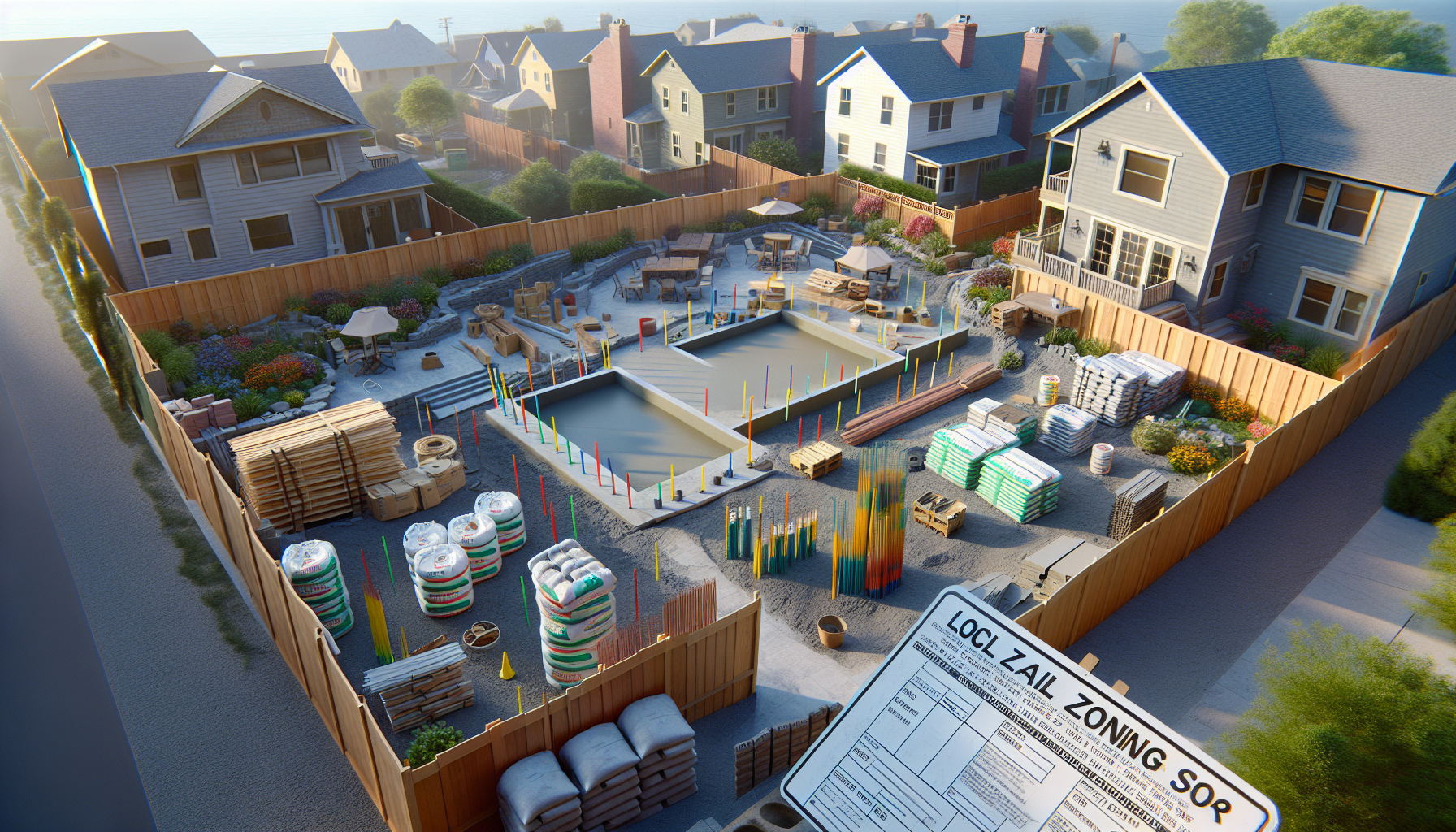
Planning an outdoor enhancement can be exciting, but understanding the necessary building regulations is essential. Many homeowners underestimate the significance of local zoning laws, which can complicate their projects.
Each unique patio design has its own set of requirements, which may dictate whether a construction permit is needed.
The specific location of your outdoor living space influences the regulations that apply.
It’s always best to consult with local authorities to steer clear of fines and ensure your project meets safety standards.
Click here to learn more about: deckbuildergoldcoast.com.au
Understanding Building Regulations For Patios
Expanding on the previous discussion about local zoning laws, knowing building regulations is essential for creating a successful outdoor living space. These rules ensure that any improvements to your home meet safety standards and comply with regulations governing residential construction.
Before starting any project, it is important to check with local authorities to understand the specific requirements in your area. Factors such as the size of your outdoor structure and its location are crucial in determining whether you need a construction permit.
Adhering to municipal codes is vital. These regulations help maintain property lines and ensure proper land use. Homeowners should research neighborhood regulations to avoid issues during the construction phase. Understanding inspection requirements and construction guidelines will make your project planning smoother and help you follow federal regulations.
Incorporating good landscape architecture and obtaining design approval for your patio design can improve the looks and usage of your outdoor features. Furthermore, getting familiar with contractor requirements and the permit application process will ease your project journey. This way, you can turn your vision of a beautiful outdoor space into reality.

What Is A Construction Permit
Understanding what a construction permit is can greatly impact any home improvement project. These approvals are not merely formalities; they ensure that your planned outdoor living space complies with established safety standards and community guidelines. Adhering to local building regulations and zoning laws makes this understanding essential.
The Importance of Construction Permits
The permit review process is key for protecting the integrity of the neighborhood and confirming that your construction matches defined inspection requirements. Not obtaining this essential document can lead to significant legal repercussions, including fines or project delays.
Required Documentation
Typically, a detailed site plan is needed, outlining the specifics of your proposed work and facilitating necessary inspections by local authorities. Being aware of these permits can aid you in navigating the complexities of home renovations or future property transactions with certainty.
Building Approvals
- Building approvals are vital for maintaining compliance with local building codes and regulations.
- Securing permits helps avoid legal issues and potential fines during construction.
- A comprehensive site plan is often required to assist in inspections by authorities.
- Understanding the permit process is essential for smooth home renovations and property transactions.
Importance Of Outdoor Living Space
Enhancing Quality of Life
Linking the insights from our earlier discussions about building regulations and construction permits, creating an inviting outdoor living space can greatly improve the quality of life at home. These areas extend beyond traditional confines, offering opportunities for relaxation and entertainment while ensuring compliance with architectural guidelines and community standards.
Sustainable Choices
In recent years, trends have favored the use of eco-friendly materials, which not only minimize environmental impact but also enhance visual appeal. By choosing sustainable paving materials and integrating landscape design elements, homeowners can develop spaces that positively contribute to both aesthetics and the environment.
Planning and Compliance
Proper planning is crucial, as it involves assessing available space and managing the permit application process. Understanding local authorities’ requirements and specified site plans will ease project execution and satisfy zoning laws and building codes.
Versatile Outdoor Features
With thoughtful patio design, homeowners not only increase property value but also enjoy diverse outdoor ideas, such as cooking areas or peaceful lounging spots. These well-arranged outdoor structures are perfect for family gatherings, restful retreats, and a richer home environment.
Navigating Zoning Laws For Patios
Understanding zoning laws is essential for a successful outdoor living space project. Every step, from a detailed site survey to knowing local regulations, plays a crucial role in making sure your patio design aligns with community standards.
A thorough site survey is vital as it helps identify potential limitations such as topography, drainage, and existing structures. These factors not only affect aesthetic choices but are also key to meeting inspection requirements and ensuring structural integrity.
Moreover, neighborhood regulations impose specific guidelines regarding allowable structures, sizes, and setback requirements. By understanding these zoning laws, homeowners can design within the building envelope to maximize usable outdoor space while staying compliant with local authorities.
It’s equally important to consider contractor requirements. Working with qualified professionals familiar with building codes and community standards can greatly enhance the quality of work and ensure all project planning aligns with the permit process. Remember that permit fees can vary significantly, so consulting your municipality can help accurately budget your home improvement project.
Supporting Facts for Creating an Inviting Outdoor Space
- A site survey helps identify potential limitations such as topography, drainage, and existing structures.
- Neighborhood regulations may include zoning laws, setback requirements, and height restrictions that affect design choices.
- Understanding the building envelope is crucial for maximizing usable outdoor space while adhering to legal guidelines.
- Hiring qualified contractors can ensure compliance with local codes and enhance the quality of the project.
Home Improvement Projects And Permit Requirements
Using the insights shared about zoning laws and outdoor living space, starting home improvement projects often brings a mix of excitement and challenges, especially concerning the required legal framework. When planning renovations, whether it’s a home addition or enhancing your backyard, understanding the need for a construction permit is vital to ensure everything meets local regulations.
Obtaining a construction permit involves submitting a permit application and gathering necessary documentation, which can vary widely based on location. Familiarizing yourself with the specific building codes and municipal guidelines in your area is essential.
A thorough site survey can help clarify the unique zoning laws that affect landscaping permits and overall project planning, as these laws directly influence what is permissible on your property lines.
Consulting with local authorities before beginning any alterations ensures compliance with community standards, helping to avoid the risk of significant fines or required removal of completed structures due to oversights on permit processes.
Additionally, understanding the architectural guidelines and property lines will help align your project with neighborhood regulations, thus increasing the long-term value of your home renovations.
Exploring Patio Design Guidelines
Understanding the details related to local authorities and construction permit requirements, creating a functional outdoor living space requires careful attention to various design guidelines. Homeowners must recognize that following community standards is important, as these regulations impact everything from size to materials for the patio design.
Staying informed about zoning laws helps avoid unexpected issues during the permit application. By thoroughly reviewing municipal codes, planning can proceed smoothly, increasing the chances of design approval. Incorporating these guidelines into your site plans not only improves structural integrity but also ensures compliance with building codes.
Additionally, a well-planned landscape architecture elevates the beauty of the space while promoting construction safety for all users. Engaging professionals skilled in landscaping permits and outdoor features can offer valuable expertise, simplifying the project and making it easier to handle complex compliance obligations.
Outdoor Space Transformation
- Compliance with homeowner rules can prevent delays in the permit process.
- Effective landscape design enhances aesthetic appeal while ensuring safety.
- Hiring experienced professionals can assist in managing complex compliance requirements.
- Following community standards can improve property value and neighborhood harmony.
Engaging Local Authorities For Permit Approval
Understanding local regulations is crucial for navigating the permit approval process. Engaging with local authorities is a vital step in this journey. Building inspectors ensure that all projects comply with safety and quality standards, which is essential for a successful outcome.
Getting to know residential zoning and construction guidelines can significantly reduce the likelihood of delays or issues later on. This preparation streamlines the permit application process and boosts the chances of gaining approval for your outdoor living space.
Researching the criteria set by local authorities enhances project planning. When developing your proposal, highlighting elements such as construction safety and the benefits to the community can strengthen your case for the project.
Keeping communication open with officials leads to productive interactions and builds the trust needed for collaboration. Regular follow-ups on your application show commitment to the permit process and can facilitate progress toward your home improvement goals.
What Are The Inspection Requirements
Understanding the significance of working with local authorities and knowing regulations is essential. Effective oversight is crucial in any construction project. Following homeowner rules helps ensure your outdoor living space meets safety and quality standards.
Local regulations typically outline the specific assessments needed. These include foundational checks and evaluations of structural integrity. Each inspection requirement is designed to protect the overall quality of your project and ensure compliance with building codes.
Consulting with local authorities is necessary to avoid future issues related to land development. Getting familiar with required inspections early can simplify the permit application process. This can make the project flow smoother.
Keeping detailed records of each stage in the evaluation process aids in effective property management. This documentation serves as proof of meeting safety standards and can be helpful in case of disputes related to municipal codes.
Be aware that skipping necessary assessments can lead to costly fines or legal issues. This highlights the significance of adhering to established construction guidelines. Staying informed about local zoning laws and inspection requirements can help you avoid challenges in your project.
What Is The Difference Between A Patio And A Deck In Your Backyard
What Is The Cost Of Building A Patio
